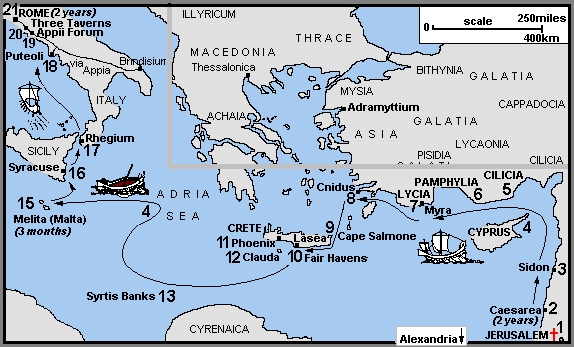
No one made a movie about Paul’s shipwreck. But hundreds of thousands have read about it.

About midnight on the fourteenth night of the storm, as we were being driven across the Sea of Adria, the sailors sensed land was near (Acts 27:27).
Two weeks. 324 hours. Almost 500 nautical miles. The storm has blasted its fury on the ship and its crew and passengers. Suddenly, in midnight’s blackness, the sailors hear waves crashing on rock and sense land is near.
They took soundings and found the water was only 120 feet deep. A little later they sounded again and found only 90 feet. At this rate they were afraid we would soon be driven against the rocks along the shore, so they threw out four anchors from the stern and prayed for daylight (Acts 27:28,29).
Soundings show water’s depth shrinking fast. They throw out stern anchors.
Then the sailors tried to abandon the ship; they lowered the lifeboat as though they were going to put out anchors from the prow. But Paul said to the commanding officer and the soldiers, “You will all die unless the sailors stay aboard.” So the soldiers cut the ropes and let the boat fall off (Acts 27:30-32).
Sailors try to abandon ship in the lifeboat. Paul warns everyone will die unless they all stay aboard. The sailors cut the lifeboat’s ropes and waves catch it away.
As the darkness gave way to the early morning light, Paul begged everyone to eat. “You haven’t touched food for two weeks,” he said. “Please eat something now for your own good. For not a hair of your heads will perish.” Then he took some bread, gave thanks to God before them all, and broke off a piece and ate it. Then everyone was encouraged, and all 276 of us began eating — for that is the number we had aboard (Acts 27:33-37).
Night’s eerie darkness surrenders to pre-dawn light. Paul, the prisoner, has become a leader. He urges everyone to eat. They’ll need strength for the challenge ahead. With words reminiscent of the Eucharist, he eats. His confidence encourages them all. The whole ship—276 of them—start eating.
After eating, the crew lightened the ship further by throwing the cargo of wheat overboard. When morning dawned, they didn’t recognize the coastline, but they saw a bay with a beach and wondered if they could get between the rocks and get the ship safely to shore. So they cut off the anchors and left them in the sea. Then they lowered the rudders, raised the foresail, and headed toward shore (Acts 27:38-40).
The crew throws overboard the wheat cargo, a final attempt to lighten the ship. Morning brings clear sight of an unknown coastline—a bay with a beach. Could they sail between the rocks and reach shore? They try.
But the ship hit a shoal and ran aground. The bow of the ship stuck fast, while the stern was repeatedly smashed by the force of the waves and began to break apart. The soldiers wanted to kill the prisoners to make sure they didn’t swim ashore and escape. But the commanding officer wanted to spare Paul, so he didn’t let them carry out their plan. Then he ordered all who could swim to jump overboard first and make for land, and he told the others to try for it on planks and debris from the broken ship. So everyone escaped safely ashore (Acts 27:41-44)!
The ship hits a sandbar, its bow aground while waves smash the stern. Guards who lose prisoners pay with their lives. “Kill them!” shout the soldiers. “Kill them before they escape!” But the centurion wants to save Paul; he orders the prisoners spared. Everyone is commanded overboard, swim or float on debris. They all survive the stormy waves and reach the beach.
* * *
Hard to imagine the apostle Paul swimming for his life through rough seas from a shipwreck toward a strange shore. I find it harder to imagine God’s reason for sending Paul on that ship to Rome. Surely there were others. Earlier, when the seas weren’t so treacheerous. Paul did evangelize on their safe island. And Lord only knows the effect of his witness on the ship’s crew and the centurion with his soldiers. But two years of prison in Caesarea and a long near-deadly ship vogage seem an outsized price to pay. God must have had other reasons, I guess. But he’s not telling.
What’s even more surprising is that God didn’t save Paul from shipwreck, but through it. How like Jesus! God didn’t save Jesus from the cross, but through it. That’s good news.
So is this: God saves his suffering people. Here’s the less-good news: God saves his people through suffering, but usually not from it.
I’m staggered at how many and how much Christians suffer. In Walking with God through Pain and Suffering, Pastor Timothy Keller writes, “No matter what precautions we take, no matter how well we have put together a good life, no matter how hard we have worked to be healthy, wealthy, comfortable with friends and family, and successful with our career — something will inevitably ruin it.” Death, and often its painful precursor, is the ultimate example. It comes to us all–the most devastating shipwreck.
But God saves us through it. If we’re believers, we pass through “the valley of the shadow of death”–and meet Jesus on the other side, suffering gone with the “better by far” come.
Still, while surrendering to his will, I pray God save me from “shipwrecks.”
Well said how God doesn’t always save us “from”, but He always saves us “through”. AMEN.